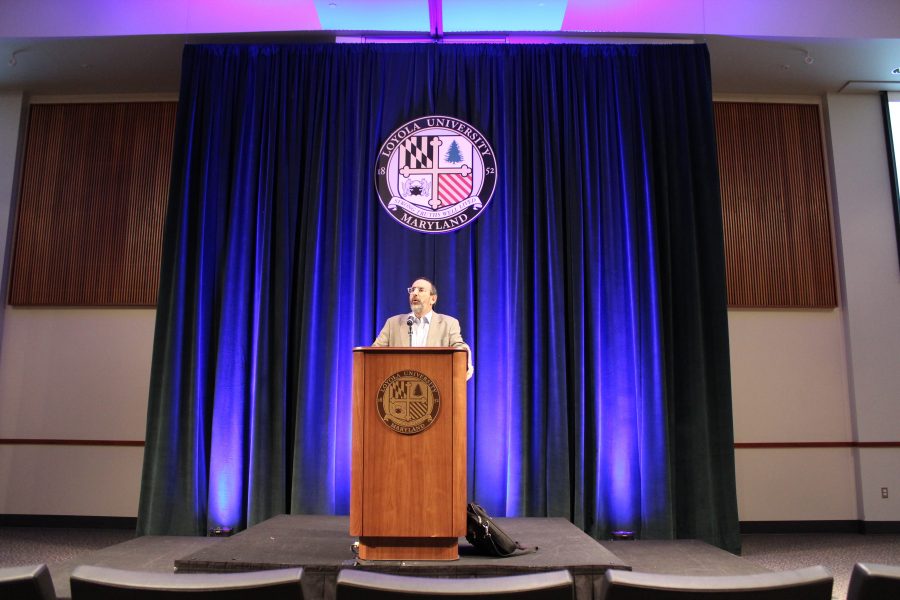On Oct. 30, the Center for the Humanities and the Theology Department sponsored a common text lecture entitled “Eve: Villain or Heroine?” The lecture was given by Dr. Benjamin Sommer of the Jewish Theological Seminary, who has written numerous books on Jewish Scripture and is currently writing a book about the Psalms.
The lecture was based on the story of Adam and Eve. Sommer discussed how Genesis 2 and 3 are among the most important chapters in the Bible due to the important role they have played in Western culture, as well as the impacts of the different interpretations of the story many have come to know.
“The most standard reading of this story in Western culture is that the story tells of the creation of humanity and the fall from a great place to a lesser place into a world marked by sin,” Sommer said. “[It is] the reason humanity went from bliss to toil and pain.”
A widely-read understanding of the story is that the eating of the forbidden fruit in the Garden of Eden by Eve and later Adam is the “original sin” and the reason for the less than perfect world we live in today.
Sommer discussed how many people use this story of Adam and Eve and these particular chapters of Genesis to say that women should be subservient to men due to the order of creation and what God says to Eve after the fruit is eaten.
In Genesis 3:16, it states. “To the woman he said, ‘I will make your pains in childbearing very severe; with painful labor you will give birth to children. Your desire will be for your husband, and he will rule over you.’”
This is often viewed as God cursing Eve, forcing women to have painful child birth and to be in a submissive relationship to men.
However, Sommer explained this is not the only reading.
He explained that in an exact translation from the original Hebrew text, which he showed in his PowerPoint, the passage reads, “He said, ‘I will greatly increase your toil and pregnancies along with travail shall you beget children. For to your man is your desire, and he shall predominate over you.’”
This specific translation, Sommer argued, is rather saying that women will have many pregnancies and overall toil. In other words, instead of having pain in childbirth, women will have to have a lot of kids and must work hard.
“In ancient Israel, big families were valued. Most Israelite peasants were farmers, and they needed a large labor source,” Sommer said. “It explains and justifies how you need to work hard and you need to have a lot of pregnancies, even though many children may not live long, as you will need kids to help with the farm. It is about family size, not gender roles.”
Sommer shared that Carol Myers, author of “Discovering Eve: Ancient Israelite Women in Context,” believed God’s words to Eve were not actually a punishment and that the story might be less significant than we think. This is especially due to the fact that Adam and Eve are not really mentioned anywhere else in the Bible, so they aren’t really that important of characters.
However, Sommer explained stories at the beginning of anthologies, such as the Bible, are important. As such, the story of Adam and Eve, who are considered the “ancestors of all the world,” is probably more important than Myers thinks.
Sommer also shared a completely different reading of the story of Adam and Eve that many may not have considered before.
He shared that the story is fundamental to the lives of human beings, as it shows how to be a human. The story can’t be about sin because sin is disobedience toward God, an action neither Adam nor Eve had the ability to choose when they ate the fruit.
“But if you don’t know the difference between the good and bad, it is not a sin. Until they ate the fruit, neither were capable of being good or evil, and so sin only became an option after they ate the fruit,” Sommer said.
He argued that perhaps the story is not about a fall but about a rise and how humanity acquired the ability to be moral and immoral—essentially the story of how humanity became human and moral agents.
Sommer pointed out that the word “sin” only appears in the Bible after the fall from Eden in the story of Cain and Abel, as they were the first beings born into a world where people could make choices. Cain is the first human being who is born in a natural way. Therefore, he is the first character in the Bible that resembles us and was born and not created.
“The story of Adam and Eve is a homecoming. If Adam was made to work the soil, when he was first placed in a perfect world, he wasn’t at home doing what he was supposed to do, until he was kicked out of Eden,” Sommer said.
This reading gives a different view of sin, and that Adam and Eve isn’t about origin of sin, but instead morality. It is about the origin of ethical action as much as it is about the origin of sin.
“This allows for a wide variety of readings. There is not one right reading, which is what makes Scripture interesting and deep,” Sommer said. “People are still reading thousands of years later, even when there is not one correct way, and we can set it in all different areas and all talk about and discuss different interpretations.”















































































































